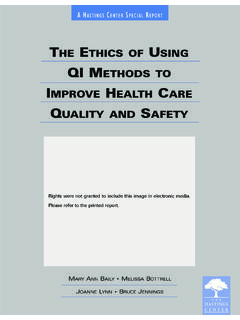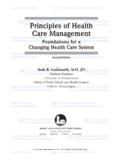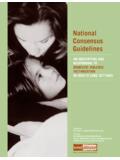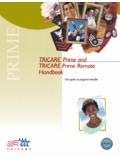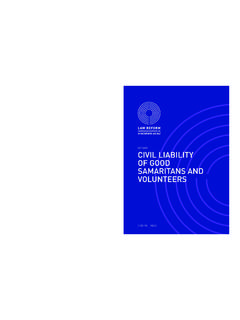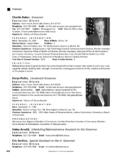Transcription of Cost Control and Health Care Reform: Act 1
1 cost Control and Health care reform : Act 1 Commentary from the Health care cost Monitor blog, May September 2009 The Hastings Center 2009, The Hastings CenterAll rights : Daniel CallahanAssociate Editor: Susan GilbertResearch Assistants: Polo Black Golde and Ross WhiteDirector of Public Affairs and Communications: Mary CrowleyNew Media Director: Jacob MosesArt Director: Nora PorterThe Hastings Center is a nonpartisan bioethics research institution dedicated since 1969 to exploring issues in medicine, public Health , and science as they affect individuals, society, and the public Hastings Center21 Malcolm Gordon Road Garrison, NY 10524(845) Follow us on twitter ( ), and find us on facebook ( )The Health care cost Monitor is made possible by generous support from individual supporters of The Hastings Center. Please consider supporting the Center today with a tax-deductible Resources from The Hastings Center connecting American Values with Health ReformEach of the eleven essays in this set examines a different foundational value and what its policy implications for Health reform are if we take it seriously.
2 Hastings Center ReportA premier journal in bioethics that explores the ethical, legal, and social issues in medicine, Health care , public Health , and the life sciences. Bioethics ForumDiverse commentary on issues in bioethics published weekly online at The Hastings CenteriHealth care reform : The Beginning of the End, or the End of the Beginning?The Health care cost Monitor came to life last May, beginning with a wise, and less than optimistic, post by Henry Aaron. American Health care , he pointed out, seems designed to make cost Control as difficult as possible. Nothing in the ensuing months, as congressional efforts to shape legislation have made clear, has disproved his perception. The Congressional Budget Office had, in 2008, released a comprehensive survey about many cost Control possibilities, showing their potential benefits and liabilities.
3 Many of them were strong and made economic sense. But it has so far been hard to find evidence that any of the tough proposals will get anywhere. So far, they seem to have disappeared. The politics of cost Control counts for more than the economics of Control . As editors of the blog the only blog devoted entirely to curbing Health care costs we saw as our task getting out on the table a wide range of perspectives on cost Control , many of them not familiar to the media or legislators. We worked hard to recruit the best minds in the country on Health care costs, gave them more than the usual blog space to develop their ideas, and sought to take on a wide range of pertinent topics. Among other topics, we posted commentaries on comparative effectiveness research, prevention, the public plan choice, competition, Medicare, regional variation, rationing, and ef-forts in other countries to manage costs.
4 We hoped to help dis-pel some widely held beliefs the British NICE program for medical technology assessment, for instance, cannot make the final decision on technologies not worth the money; it can only make recommendations to the National Health Service, and they are sometimes rejected. We were pleased when someone characterized ours as an elite blog. We like to think that was because we did tolerate long pieces, mainly on the grounds that not just opinion but also good analysis are important. Our posts were models, we believe, of civilized discourse. No fingers were bitten off, we are proud to say, even granting the difficulty of doing that in the blogosphere. We have called the blog posts collected here Act 1 up to early September 2009 to signal that they were all written while the Health care debate was beginning to heat up and for-mal bills were still in an embryonic state.
5 Act 2, perhaps the decisive phase (though who can say?), got under way when Congress reconvened in early September. We will follow care -fully the emergent legislation, focusing as we did earlier on cost Control , but this time on the cost Control details of the leg-islative proposals. How those details are handled will be a crucial test of their seriousness. The danger in neglecting them, or treating them vaguely, may not be immediately obvious, but any legislation that, say, is light on cost Control in the name of making certain that access is expanded as a first priority will have built into it the long-term likelihood of collapse in the face of cost escala-tion. The state of Massachusetts gambled that it would be smart to deal with access first and costs later. It is only now taking up that latter issue, and its overall fate is at stake.
6 The outcome of that effort will be important to watch. We expect the fall to be a fateful season for the future of American Health care . We will be watching carefully. Daniel CalLahan editor, Health care cost MonitorSUSAN GILBERT associate editoriiCompetition: The Public Plan's Fatal Flawby Daniel CallahanA public plan grounded in competition will not Control costs. Defusing the Health care Time Bomb: Lessons from the 1990sby Alain EnthovenFive actions should be taken to reduce Health care expenditure growth and GDP care reform : The Role of Hospitals and the Need for Equityby Blair L. SadlerHow can hospitals support Health care reform and remain financially viable?MedicareFixing Medicareby Muriel Gillick, We need to recognize the shortcomings of Medicare in managing chronic Trends in Heart Disease, End Stage RenalDisease, Cancer, and Metabolic Syndromeby Polo Black GoldeWhere Medicare money is Treatments for the Oldest Patientsby Sharon KaufmanThe ability to prolong life with modern medicine is very Death Optional?
7 By Muriel Gillick, realistic conversations about care that has little benefit at the end of life can help clarify the personal as well as the financial EffectivenessOne Size Doesn't Fit All by Peter Ubel, who stands to benefit the most from certain treatments may lead to more meaningful comparative effectiveness Comparative Effectiveness Research Can Save Moneyby Susan Bartlett FooteComparative effectiveness research faces hard opposition from those who would lose Effectiveness Research and the Doctor-Patient Relationshipby Eric Cassell, can provide valuable knowledge to better support doctor and patient Fine Line Between Waste and Marginal Benefitsby Daniel CallahanQuestioning the marginal benefit of medical interventions is both appropriate and Colonoscopy: A Window into the Challenges of Health care Reformby Ruth Faden and Sean TunisMaking sense of comparative effectiveness research is harder than it and Comparative Effectiveness Researchby John Geyman, costs are rising more sharply than most other Health care costs, requiring better informa-tion on what treatments work, and for and Health care Costsby Joseph WhiteCompetition is not what our Health care system Truth to Evasion by Daniel CallahanFailing to talk honestly about Health care costs will only lead to failure to Control the cost Insanity: Some First Stepsby Henry J.
8 AaronCost effectiveness and learning from the past will help cut Control : Where Does it Stand?by Daniel CallahanThe Senate Finance Committee s inital recommen-dations for controlling costs did not go far enough. PreventionPrevention Will Reduce Medical Costs: A Persistent Mythby Louise B. RussellPrevention has admirable goals, but it will fail to save money in the long Plan ChoicePublic Plan Choice: A Conversation with Jacob S. Hackerby The EditorsA Medicare-like public plan option would bring healthy competition and increase and cost EffectivenessComparative Effectiveness Research and Medicareby Jacqueline FoxMedicare currently lacks necessary gatekeeper mechanisms to consider cost in coverage : Why It Is Ethicalby Dan BrockRationing, once understood properly, is necessary for any good Health Limited Ethics of Rationing: A Response to Dan Brockby Joseph WhiteBefore calling for rationing, let us reduce inflated Health care by Rationing ?
9 Not Hereby Susan GilbertMore honest discussions and support in end of life care decision-making can illuminate less is more Regional Variations in Spendingby Anthony MarfeoA focus on quality rather than quantity can help to reduce regional variations in Medicare CountriesCost Control in the Netherlands: Testing Market Practicesby Hans MaarseThe Netherlands struggles with a widening gap between Health care revenues and expenditures. cost Control in Europe: Inefficiency is Unethical by Richard B. SaltmanEuropean countries have institutional frameworks built in to cut Control in Canada: Complaints of Underfunding by Theodore MarmorCanada effectively budgets expenditures by setting explicit limits. How Nice is NICE? A Conversation with Anthony Culyer by The EditorsCost effectiveness research leads to better Health and cost Effectiveness and Rationing: Lessons from NICEby Mark Helfand and Louise RussellCost effectiveness provides valuable clinical information and does not require in the Steven Pearson, would not be as effective in the as it is in Choice Abroadby Richard B.
10 SaltmanHow much choice of their doctors do Europeans really have?3133353740424547505254575961646668i iiOpportunity Costsby Norman DanielsMedicare should consider opportunity costs in making coverage Rationing Be Painless?by Leonard FleckMost Americans understand the need to Control Health care costs, but they do not want limits on the care that their doctors PayerSingle Payer: A Conversation with David Himmelstein and Steffie Woolhandlerby The EditorsA single payer system would reduce administrative costs and provide universal EffortsThe Massachusetts Health Plan: A Conversation with Jonathan Gruberby The EditorsMassachusetts Health care reform has vastly increased insurance coverage, but now the focus is on ways to contain Effectiveness: One Size Doesn't Fit All Peter Ubel, sooner had the Obama administration committed a billion dollars to comparative effectiveness research than the critics began laying out their concerns: such research is a prelude to rationing, they said.

